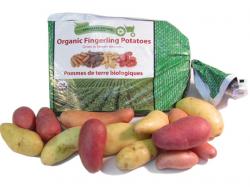Specialty Potato Alliance Announces A Full Line Of Retail Organic Fingerling Potatoes
October 11, 2011 | 2 min to read

Atlanta, GA– Specialty Potato Alliance (SPA) announces the launch of their organic retail line, timed for a debut at the PMA’s Fresh Summit International Convention and Expo in Atlanta, Georgia. Richard Leibowitz, Managing Director of Specialty Potato Alliance stated last week, “I am ecstatic to now be able to offer a full line of organic fingerlings to our retail customers. I have been working closely with our farmers this past year to launch organics for the holiday season of 2011 and we now have three products in this category.” Leibowitz refers to the new bags available from SPA: an organic mixed fingerling, organic yellow fingerling and an organic red fingerling, all with individual UPC coding and color specific packaging.
SPA’s organic fingerling potatoes are being harvested in California and Colorado by Alliance members and partners. Certified by CCOF and the Colorado Department of Agriculture, the mix of organic fingerlings will include heirloom fingerlings and the Alliance’s proprietary varieties, the Rockey Rose and the Red Rebel. Scott Pursel, a SPA member/farmer with Lehr Brothers in Bakersfield, CA, states, “Our yields have increased significantly since 2009 and we should be able to accommodate an exceptionally strong year-round organic program within the next two years.”
Mark Pittenger, managing team member of the Alliance in charge of sales and marketing, explains that the new bags protect the tasty fingerlings from discoloration and create a full line of organic retail fingerlings. Pittenger hopes to use the French and English bi-lingual bags to further push SPA sales into Canada where the delicious pommes de terre biologiques are often requested. “This extends our family of products into both the international marketplace and the natural foods arena”, stated Pittenger. SPA has chosen to use the Fox Packaging recyclable Combo Ultra Shield™ potato bag. This special breathable potato bag has a two-layer black and white poly film side that prevents nearly 100% of visible light and 90% of ultraviolet light, proven to decrease potato greening and ensure a longer shelf-life.
The new organic packaging will make its world premier at the PMA Fresh Summit in Atlanta, GA, October 14th – 17th, 2011. Displayed in the new product showcase at the event’s Level 2 lobby, all new packages are characterized by the Alliance’s distinctive burlap print and the green tractor logo. SPA will be offering mixed organic fingerlings to all tiers of foodservice with packaging in 50 lb., 20 lb. and 10 lb. cases.
For more information about Specialty Potato Alliance, the new 1.5 pound organic fingerling packages and SPA’s complete family of products, please contact Mark Pittenger or Jill Overdorf at 908.913.1600 or visit the company display at booth #734 to taste the product and meet the SPA farmers.
Source: Specialty Potato Alliance
